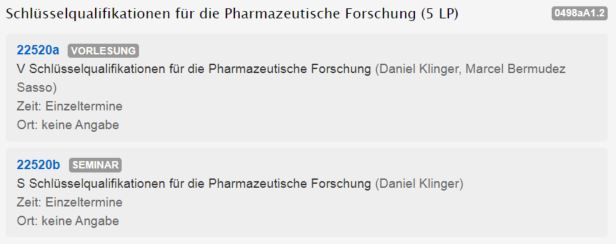Module description
The module “Key Qualifications for Pharmaceutical Research” is designed to give you the theoretical background and practical skills for becoming an independent scientist. It aims to help you performing your own individual research projects independently by developing the required know-how and tools on scientific methods and communication.
This module is addressing all the different study backgrounds that you might bring to this master’s program. It aims to provide you with the necessary key qualifications, not only to complete your master studies, but also to make you a member of the global scientific community.
The skills you learn will help to conduct your own research and communicate it
The module is offered towards the middle/end of each summer semester and consists of a lecture and a seminar. While the lecture will introduce you to theoretical background, the seminar will be a hands-on course on scientific presentation. This will be helpful throughout your research project and your master thesis.
- Type: mandatory module.
- Structure: lecture and seminar
- Time: only summer semester
- Electronic course catalog ID:

- Requirements for completion: successful completion of lecture and seminar
- Credit points: 5 CPs
- Examination: none
The lecture
The lecture is offered as a block seminar towards the middle/end of each semester, generally over 4-6 weeks. Topics span from the theory of science, over statistical methods and the scientific method, to science communication.
- Topics:
What is science and the scientific method?
Tips and tricks for successfully addressing a complex research topic.
Literature research– reading papers efficiently.
Designing experiments and time management.
Data presentation – plotting and visual aids.
Effective writing of scientific papers.
Effective preparation of scientific presentations.
Statistical methods.
Introduction in R.
Scientific databases.
Introduction in drug development and clinical studies.
- Lecturers:
D. Klinger and M. Bermudez - Time:
Each lecture will take 1-2 hours - Schedule:
The schedule of the lecture series will be communicated via the Blackboard course “Key Qualifications”, the announcements in the Blackboard course “Introduction to the Master’s Program”, and/or via the e-mail list at the beginning of each semester.
The seminar
In the seminar, we will focus on one of the most important aspects of research: communication!
By exaggerating, you could say that the best results are useless if no one gets to know them.
Thus, communicating your research with a clear concise message is crucial for any scientist. This involves different media like journal articles or presentations and should be adapted to the specific audience.
In this seminar we will focus on training your presentation skills in the small setting of your peers. For this, everyone of you will give a short presentation which we will discuss in the group. This will be great starting point for training towards the final master thesis defense.
- Your presentation – topics and time:Presentations should be a brief concise introduction into a broader research topic or a specific research project. Thus, presentations should me maximum 10 min long.
The topic of your presentation can be chosen by yourself and should be coordinated with the lecturer. If you already have started a research project or your master thesis, this might be a good opportunity to give an overview over your research. If you do not have started any research work yet and you do not have identified a topic by yourself, you will be assigned a topic by the lecturer.
Since this lecture is not only about training but also about getting more experience in different research areas, you should not give the same presentation as in the seminar “Current Topics”.
- Lecturer:
D. Klinger - Time:
Each meeting will take 2-3 hours - Schedule:
The seminar will take place after the The schedule of the seminars will be communicated via the Blackboard course “Key Qualifications”, the announcements in the Blackboard course “Introduction to the Master’s Program”, and/or via the e-mail list at the beginning of each semester.